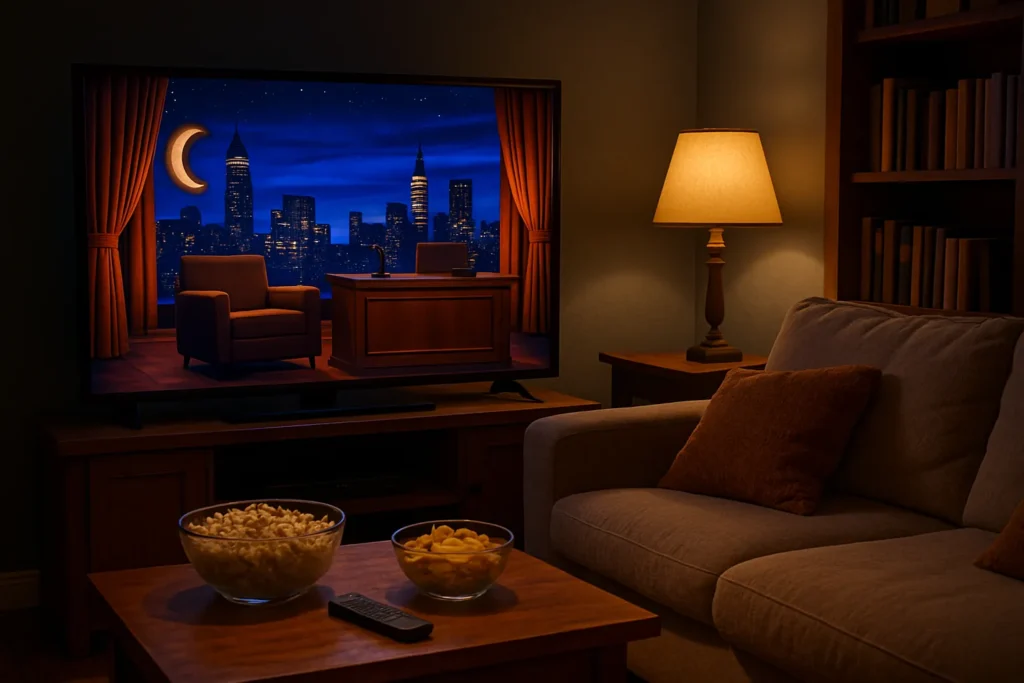The Twilight of Late Night: An Industry at a Crossroads
Few moments capture the shifting sands of television quite like Conan O’Brien’s induction into the Television Academy Hall of Fame at the J.W. Marriott in downtown Los Angeles. As O’Brien took the stage—sharing honors with icons like Viola Davis, Ryan Murphy, and Henry Winkler—he offered not a victory lap, but a poignant diagnosis: Late-night television is, by his estimation, on the verge of extinction. Addressing an audience steeped in TV tradition, O’Brien quipped about the genre’s origins, suggesting late-night was “originally designed to distract college students until the internet—and online pornography—were perfected.” The zinger drew laughs, but the message was clear and sobering.
The backdrop to O’Brien’s induction is a media ecosystem transformed by streaming platforms, social media, and a fragmentation of audience attention. According to a recent Nielsen report, less than 17% of viewers under age 35 tune in to traditional broadcast late-night shows—a stunning drop from even a decade ago. The familiar late-night desk, the studio audience, the monologue and celebrity banter: for generations, these were as reliable a part of American life as Johnny Carson’s smile or David Letterman’s Top 10 lists. Now, with Colbert’s Late Show set to conclude in 2026, the steady erosion seems irreversible.
This isn’t mere nostalgia for TV’s golden age. The genre’s decline raises fundamental questions about our culture’s connective tissue: Who holds the nightly mirror up to society, poking fun at the powerful and reassuring the public in troubled times? For progressives, late-night’s capacity to challenge orthodoxy and champion dissenting voices has always been more than entertainment—it’s been civic engagement at its most accessible.
Stephen Colbert: Too Talented—and Too Essential—to Disappear
Against that landscape, O’Brien’s remarks about Stephen Colbert land with special weight. Facing his own show’s impending ending and the rumored retirement of CBS’s Late Show franchise, Colbert is at the tipping point of both crisis and opportunity. O’Brien made his conviction plain: “Stephen Colbert is too talented and too essential to go away”—a sentiment echoed by many in the creative community. O’Brien predicted that Colbert would “evolve and shine brighter than ever in a new format that he controls completely.”
Colbert’s trajectory, from his bushy-browed parodist on The Colbert Report to America’s most trusted late-night political commentator, has always defied easy categorization. His presence is more than the sum of skits and interviews; Colbert’s show has often been the one place where liberal viewers could count on trenchant, unapologetic opposition to right-wing talking points—a safe haven during the chaos of the Trump years. That his voice might be silenced, or scattered across dozens of streaming feeds, alarms viewers who’ve come to rely on late-night as the nation’s wisecracking conscience.
“Despite seismic change, the essence of television remains good stories, honest and inspired performances, and brave people of goodwill.”
Political satire is not merely about laughs. As Harvard media scholar Dr. Lila Shah notes, “Late-night shows have often served as the ‘first draft of history’—making complex issues accessible, puncturing propaganda, and providing crucial catharsis for viewers living through divisive times.” O’Brien’s faith in Colbert’s adaptability is well placed. Already, Colbert’s public jousting with politicians—such as his recent back-and-forth with President Donald Trump—keeps the importance of dissent and truth-telling in the national spotlight, even as the platforms evolve.
Why the Format May Die, but the Mission Endures
The real question is not whether late-night TV, as we’ve known it since the 1950s, will survive—most experts, including O’Brien himself, doubt that it will. The traditional pipeline is crumbling. Today, viral clips, TikTok reels, and on-demand streaming set the tempo. Cable subscriptions dwindle as new generations refuse to schedule their laughs around network timetables.
Yet the challenge comes paired with opportunity. O’Brien, in his Hall of Fame speech, cited the continued vitality of projects like Abbott Elementary, Hacks, and I Think You Should Leave with Tim Robinson as evidence of Hollywood’s enduring creative pulse. These successes prove that brave, original storytelling can still break through—not just on network television, but across platforms. That same creative reinvention awaits someone like Colbert. Might his next act reach more people, and in new, unfiltered ways?
If the old formats die, it is as much because of economic and political pressures as technological ones. A closer look reveals the chilling effects of politicization—late-night hosts who refuse to toe conservative lines sometimes become targets. The fear and fatigue around contemporary politics, paired with the relentless churn of online outrage, place unique pressures on progressive voices. Even so, abandoning the space to the loudest, least accountable online provocateurs would be a historical mistake. Past crackdowns—from the McCarthy era’s blacklists to the chilling of dissent during the Iraq War—remind us: Vibrant civic commentary must adapt, not fold.
What will fill the gap if late-night TV goes silent? Thoughtful, principled hosts must chart the way. Viewers will always crave connection and fearless truth-telling—whether on broadcast, in a TikTok stitch, or through a livestreamed monologue. O’Brien’s optimism resonates: “The focus remains on connection, talent, and ideas that come into our homes.” As American culture retools for the streaming age, those values are not going anywhere—and neither, it seems, is Stephen Colbert.

